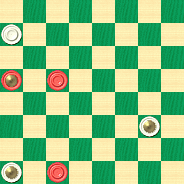The Checker Maven
Jump to navigationThe Other Benjamin

Who among us has not read The Autobiography of Benjamin Franklin, and derived untold benefit from the eminently practical wisdom and philosophy of its author? And who would be surprised to learn that Ben Franklin was himself a checker player, who praised the merits of the game as training for life?
Today's Checker School problem, though, was composed by a different Benjamin: E. A. Benjamin, to be precise, but we think it's as practical and useful, at least in checker terms, as Ben Franklin's advice for living a successful life. The problem situation is shown below.
White

Black
Black to Play and Win
B:W28,K9,K4:BK20,19,3.
Taking a closer look, we see that White has a material advantage, having two kings to Black's one, but Black's mobility is clearly superior. Is it enough to turn the situation into a Black win? Try it out, and then click on Read More for the solution, notes, a sample game, and some words of wisdom from the better-known Benjamin.![]()
Solution
Here is Ben Boland's solution and commentary.
20-16, 9-14, 16-11---A, 14-18, 3-7*, 18-14, 19-23, 14-18, 23-27, 18-23, 27-32, 28-24, 11-16*, 4-8---B, 16-12, 8-4---i, 32-28, 23-19, 7-11, 24-20, 28-32, 19-24, 11-15, 24-28, 15-18, 28-24, 32-27, 24-31, 18-23. Black Wins.
Game: 11-15, 22-18, 15-22, 25-18, 8-11, 29-25, 4-8, 24-20, 10-15, 26-22, 9-14, 18-9, 5-14, 22-17, 7-10, 28-24, 12-16, 31-26---G, 15-18, 17-13, 10-15, 26-22, 8-12, 22-17, 6-10, 25-22, 18-25, 23-19, 16-23, 27-9, 2-7, 9-6, 10-14, 17-10, 7-14, 6-2, 25-29, 30-26, 1-6, 2-18, 15-31, 21-17, 29-25, 17-14, 25-22, 14-10, 22-26, 32-28, 26-23, 13-9, 23-18, 10-6, 18-15, 6-2, 31-27, 9-6, 15-10, 6-1, 11-16, 20-11, 27-20, 11-8, 10-15, 8-4, 12-16, 1-6, 16-19, 6-10, 15-6, 2-9. Forms above position. J. Duffy, in his Single Corner Book, Variation 34, A at S.
A---19-23, 14-18, 23-27, 28-24, 27-32, 24-20*, 16-19---C, 18-22, 32-27, 22-18, 27-24, 18-22, 19-23, 20-16. Drawn.
B---24-20, 16-12*, 23-18---D, 32-27 (not 7-10, 20-16 drawn), 18-14 (18-15, 7-11,15-8, 12-3. Black Wins), 27-23---E, 14-9, 7-10, 9-6, 10-14, 6-10, 14-18, 10-7 (10-15, 23-27, 15-22, 27-23. Black Wins), 18-22, 7-10, 23-18, 10-7, 22-26, 7-3, 26-31, 3-7, 31-26, 7-3 (or 7-2; 7-10, 26-23, 10-7, 18-15. Black Wins), 18-15. Black Wins.
C---16-11, 18-23, 11-15, 23-26, 32-27, 20-16. Drawn.
D---23-19, 32-28---F, 19-23 (19-15, 7-11. Black Wins), 28-24, 23-18, 24-19, 18-14, 19-15, 14-9, 15-10, 9-5, 7-11. Black Wins.
E---27-24, now, allows a draw by 14-9, 7-10, 9-6, 10-14, 6-10, 14-17, 10-7, 24-19, 7-10*, 19-24, 10-7, 17-22, 7-3, 24-19, then 20-16. Drawn.
F---7-11, 19-24, 11-15, 24-28, 15-18, 28-24, 32-27*, 24-31, 18-23. Black Wins.
G---30-26, 2-7, 23-19, 16-30, 20-16, etc. Drawn. J. Nelson.
i---A careless 8-3 here would lose at once to 32-28. ---Ed.
The above position by Benjamin was shown in the "Roseville Citizen," in 1924, again in Aug. 9, 1934, Oct. 8, 1936, then in detail in 1937, where credit is given to various players for the different variations.
BEN FRANKLIN ON MORALS OF DRAUGHTS
Checkers (or Draughts) charmed the minds of some of our greatest American statesmen. Benjamin Franklin wrote interestingly on the game as follows:
"The game of draughts is not merely an idle amusement. Several very valuable qualities of the mind, useful in the course of human life, are to be acquired or strengthened by it so as to become habits ready on all occasions.
"For life is a kind of draughts, in which we have points to gain and competitors or adversaries to contend with, and in which there is a vast variety of good and evil events that are in some degree, the effects of prudence, or want of it.
"By playing at draughts then we learn (1) foresight, which looks a little into futurity, and considers the consequences that may attend an action; (2) circumspection, which surveys the whole scene of action, and (3) caution— the habit of not making our moves too hastily.
"Lastly, we learn by draughts not to be discouraged by present appearances in the state of our affairs, but to persevere in hoping for a favorable change, and in searching for resources.
'The game is full of events, there is such a variety of turns in it, the fortune of it is so subject to sudden vicissitudes, and one so frequently discovers after long cpntemplation, the means of extracting oneself from a supposed insurmountable difficulty, that one is encouraged to continue the contest to the last, in the hope of victory by our own skill, or at least of making a draw through the negligence of the adversary."
The Draught Board, 1870.
You can email the Webmaster with comments on this article.
